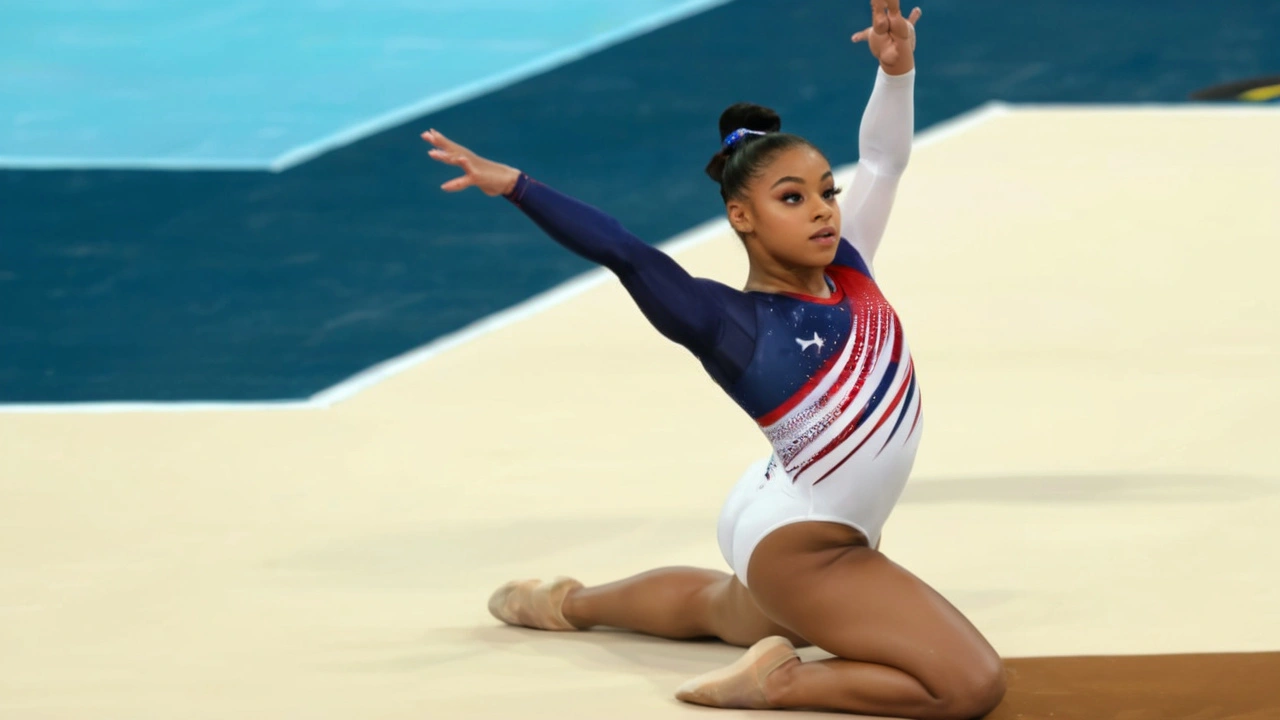CAS Ruling Changes Medal Outcome in Women's Floor Exercise Final
The Court of Arbitration for Sport (CAS) issued a landmark decision on the medal standings for the women's floor exercise final at the Paris 2024 Summer Olympics, reversing the originally adjusted bronze medal position of U.S. gymnast Jordan Chiles. The ruling determined that the inquiry submitted by Chiles' coach, Cecile Landi, regarding the difficulty value of her routine was made after the one-minute deadline stipulated by the International Gymnastics Federation (FIG). This decision has profound implications for the athletes involved, especially Chiles and Romanian gymnast Ana Barbosu, who now takes home the bronze medal.
Initially, Chiles finished her routine with a commendable score of 13.666, placing her in fifth. Following a detailed review prompted by her coach’s inquiry, the score was increased to 13.766, securing the bronze medal and elevating Chiles to third place. This re-scoring effectively pushed Ana Barbosu and her fellow Romanian competitor Sabrina Maneca-Voinea out of medal contention. The Romanian Gymnastics Federation quickly contested the change, pinpointing a critical timing error – the formal inquiry was lodged 1 minute and 4 seconds after the deadline, making it invalid according to FIG rules.
The CAS agreed with the appeal and promptly reinstated Chiles' original score of 13.666. Consequently, this decision recalibrated the medal standings, awarding Barbosu the bronze. The International Olympic Committee (IOC) confirmed the verdict and mandated the return of Chiles' bronze medal to the U.S. Olympic and Paralympic Committee. This outcome sparked a spectrum of reactions, including from the Romanian Prime Minister Marcel Ciolacu who, in an act of protest, stated that he would boycott the Paris 2024 Olympics Closing Ceremony. At the same time, gymnastics icon Nadia Comaneci voiced her frustration, highlighting the emotional and mental strain such disputes impose on the athletes.
Jordan Chiles, already a gold medalist from the team competition, found herself at the center of a storm. The ruling not only stripped her of her individual accolade but also brought about a wave of online criticism. Many in the U.S. gymnastics fraternity rallied behind Chiles, profoundaly condemning the vitriol directed towards her through social media channels. The U.S. gymnastics community expressed unequivocal support for Chiles, underlining the significant psychological toll exacted by the controversy.
Implications of the Dispute
This incident shines a light on the demanding nature of high-stakes international competitions and the imperative to adhere to established regulations. The CAS decision underscores the significance of strict procedural compliance, which has become a defining aspect of contemporary sports governance. For athletes like Jordan Chiles and Ana Barbosu, whose careers and reputations hang in the balance, such regulatory disputes can have lifelong ramifications.
The episode also raises questions about the methods and timing of score inquiries within gymnastics. With every fraction of a second and tenth of a point counting immensely toward the final outcome, the pressure on coaches, officials, and gymnasts is immense. This case evidently illustrates how such a narrow window for inquiries can create a flashpoint for broader tensions within the sport.

Reactions from the Gymnastics Community
Within the gymnastics community, the decision was met with diverse and passionate reactions. While some hailed the adherence to rules as a commitment to fairness, others perceived it as a crushing blow to Chiles' efforts and dedication. Nadia Comaneci's reaction, in particular, highlighted not only the sense of injustice felt by some but also a growing awareness about the mental health of gymnasts. The Romanian legend urged for a more humane consideration in handling dispute outcomes.
Chiles' supporters, on the other hand, focused on the broader narrative of her resilience and achievements. Recalling her triumphant role in the U.S. women's team gold, they contended that an administrative error should not overshadow her talent and hard work. The wave of solidarity online from fans and fellow athletes sought to counteract the backlash and reinforce the community spirit essential to the sport.
Long-Term Consequences
In the long term, this ruling is likely to spark a review of the FIG's inquiry protocols. Discussions may emerge about whether the current time frame is adequate and if there should be mechanisms to streamline the inquiry process during high-pressure moments. Adjustments to procedural timelines and clearer guidelines might be proposed to prevent similar controversies in future competitions.
Moreover, the incident exemplifies the evolving nature of international sports arbitration. The involvement of CAS in such disputes aligns with the broader trend of legal frameworks being increasingly interwoven with sports adjudication, emphasizing the role of law and fairness even in the domain of athletics.

The Athletes' Perspective
From the athletes' viewpoint, the journey through such a dispute can be tumultuous. Gymnasts train rigorously for years, often sacrificing personal milestones for the sake of their sport. When their success narratives are abruptly altered due to technicalities, it brings to the fore the delicate balance between passion and regulation. Chiles' ordeal illuminates the vulnerabilities athletes face, publicly and psychologically.
For Ana Barbosu, the resolution brings a bittersweet achievement. Though she secured the bronze medal, it came through an unprecedented administrative twist rather than her performance alone. Nevertheless, her perseverance and merit remain undisputed, and this scenario adds an unusual chapter to her career narrative.
The Paris 2024 Olympics will be remembered for its moments of excellence and, equally, for its share of controversies. The CAS ruling on Jordan Chiles' floor exercise score adds to the complex fabric of stories that define the spirit and the challenges of the Olympic Games.

Jasmine Hinds
August 12, 2024 AT 00:39Wow the CAS decision really shook things up 😲💥 Jordan's bronze gone and Ana gets it back 🙌💪
Madison Neal
August 12, 2024 AT 01:13It’s truly heartbreaking to witness an athlete’s hard‑earned podium finish being rescinded over a mere 4‑second procedural infraction, especially when the emotional labor involved in an Olympic performance cannot be quantified in a clock tick. The FIG’s strict one‑minute window for score inquiries, while intended to preserve competitive integrity, inadvertently penalizes gymnasts who rely on their coaches to navigate complex scoring matrices under immense pressure. Jordan Chiles’ original score of 13.666 was a testament to her execution and difficulty, and the subsequent boost to 13.766, albeit technically justified, represents a fleeting administrative correction that nonetheless altered her medal status. This reversal underscores a systemic tension between procedural rigor and athlete welfare, highlighting the need for a more flexible, perhaps tiered, inquiry process that accounts for the high‑stakes environment of Olympic finals. Moreover, the psychological toll on Chiles, who oscillated between elation and disappointment within days, cannot be overstated; such volatility can impact not only her performance mindset but also her long‑term mental health. The Romanian gymnastics community’s swift appeal reflects a broader concern that procedural missteps can undo years of preparation for athletes on both sides of the podium. From a legal perspective, the CAS decision reaffirms the primacy of established timelines, yet it also invites a re‑examination of the fairness of those timelines in practice. It is crucial for governing bodies to integrate athletes’ perspectives when drafting regulations, ensuring that procedural safeguards do not become punitive. The return of the bronze medal to Ana Barbosu, while a deserved honor, is similarly tinged with the knowledge that it was awarded through bureaucratic recalibration rather than sole performance merit. This scenario could serve as a catalyst for dialogue among FIG, national federations, and athletes to develop a more athlete‑centric scoring dispute framework. Ultimately, the Olympic spirit thrives on both competition and camaraderie; preserving its integrity demands a balance between strict rule enforcement and compassionate consideration of the athletes who embody the Games.
John Crulz
August 12, 2024 AT 01:46Looking at the whole picture, the timing rule seems clear on paper, but in practice it puts coaches under insane pressure. It’s a tough call whether to stick strictly to the rule or to consider the human element behind the missed deadline.
Anita Drake
August 12, 2024 AT 02:19We should celebrate both athletes – Jordan for her resilience and Ana for achieving a podium finish despite the controversy. Sportsmanship thrives when we support each other across borders.
Eduardo Lopez
August 12, 2024 AT 02:53The whole fiasco reveals how elite gymnastics has become a playground for bureaucratic power‑plays, marginalizing the very athletes who give the sport its soul. A true connoisseur of the sport sees this as a tragic erosion of athletic merit.
Nancy Perez de Lezama
August 12, 2024 AT 03:26Honestly this looks like an overblown drama; a simple timing error shouldn't strip a medal. The system needs to be smarter, not stricter.
Matt Heitz
August 12, 2024 AT 03:59Our national program has always upheld the highest standards, and this case shows why we must enforce every rule without exception. No one gets special treatment.
Susan Mark
August 12, 2024 AT 04:33From an observer’s standpoint, the cascade of appeals highlights how intricate gymnastics scoring really is. It might be worth simplifying the inquiry process for future events.
Jason Jennings
August 12, 2024 AT 05:06Rules are rules.
Diego Vargas
August 12, 2024 AT 05:39i think the cas decision was legit but they should rework the time limit for inquiries so it doesnt cause this kind of drama.
Alex Lee
August 12, 2024 AT 06:13The whole thing is just a mess.
Vida Yamini
August 12, 2024 AT 06:46What we can take away from this is that every fraction of a second matters, not just on the floor but also in the procedural arena. Coaches must be hyper‑vigilant, and federations should perhaps provide a clear, real‑time alert system for inquiry deadlines. It’s a learning moment for the entire gymnastics community, reminding us that the sport’s elegance is matched by its complexity.
Let’s hope future competitions incorporate these lessons.
James Lawyer
August 12, 2024 AT 07:19From a legal standpoint, the CAS upheld the FIG’s stipulated deadline, which is consistent with established arbitration precedents. The decision reflects adherence to procedural fairness.
Abby Culbertson
August 12, 2024 AT 07:53its sad how a tiny time diffrence can ruine a athletes dream.
Awolumate Muhammed Abayomi
August 12, 2024 AT 08:26Let’s keep the conversation positive and support both gymnasts – they earned their place on the world stage.
Josh Tate
August 12, 2024 AT 08:59We need to ensure that procedural rules protect fairness without becoming punitive traps for coaches. A balanced approach could involve a brief grace period or an automated system to log inquiries the moment a routine ends.
John Smith
August 12, 2024 AT 09:33Honestly, the system is broken and needs an overhaul.
Alex Soete
August 12, 2024 AT 10:06Let’s channel this energy into pushing for clearer rules and better support for our athletes – together we can make gymnastics stronger! 💪🚀